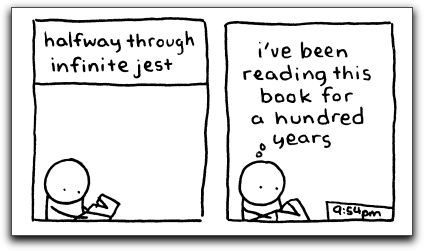
1. A Scientific American podcast/article brings to light an interesting study on the correlation between self-control and aggression, which ties in to JDK’s conference talk about the thin line between threat and promise (recording coming Monday!), ht JD:
Dieters preferred public service ads that were framed in threats, such as “if funds are not increased for police training, more criminals will escape prison.” Subjects who picked an apple over chocolate were more irritated by ads that used words like “you ought to” or “need to,” which sound controlling. They were also more likely to choose to watch a movie with a theme of hostility over other options.
Much of Wallace’s work has to do with cutting himself back down to size, and in a larger sense, with the idea that cutting oneself back down to size is a good one, for anyone… The love his admirers bear this author has a peculiarly intimate and personal character. This is because Wallace gave voice to the inner workings of ordinary human beings in a manner so winning and so truthful and forgiving as to make him seem a friend.
The article includes a priceless quote, apparently from Wallace himself, talking about his own experience in recovery:
Six months in Granada House helped me immeasurably. I still wince at some of the hyperbole and melodrama that are used in recovery-speak, but the fact of the matter is that my experience at Granada House helped me, starting with the fact that the staff admitted me despite the obnoxious condescension with which I spoke of them, the House, and the l2-Step programs of recovery they tried to enable. They were patient, but they were not pushovers…
People at Granada House listened to me for hours, and did so with neither the clinical disinterest of doctors nor the hand-wringing credulity of relatives. They listened because, in the last analysis, they really understood me: they had been on the fence of both wanting to get sober and not, of loving the very thing that was killing you, of being able to imagine life neither with drugs and alcohol nor without them. They also recognized bullshit, and manipulation, and meaningless intellectualization as a way of evading terrible truths—and on many days the most helpful thing they did was to laugh at me and make fun of my dodges (which were, I realize now, pathetically easy for a fellow addict to spot), and to advise me just not to use chemicals today because tomorrow might very well look different.
5. Thanks to some detective work by the great Caleb Maskell, we’ve unearthed an interview with Verve singer Richard Ashcroft from 2000 in which he makes his religious convictions explicit:
6. In TV, have you been watching Mildred Pierce on HBO? Not personally being much of a Todd Haynes or Kate Winslet fan, I’ve been pleasantly surprised by how superb it is. A harrowing study in mother-daughter dynamics, not to mention the self-seeking underbelly of the American/Hollywood dream, with some stunning setpieces. Think Chinatown by way of Betty Friedan and The Omen. And don’t forget, Friday Night Lights: The Fifth Season came out this week on DVD, a full three weeks ahead of its debut on NBC.
7. Conference follow-up: Beyond the recordings, if you enjoyed the delicious food, we invite you to “tip” our chef Edward Crouse by backing his very cool new Kickstarter project “Between Folks and Forks”. If it takes off, who knows – he might forgo culinary school abroad and serve us again next year…
P.S. Don’t miss FailBlog’s “Bible Study Fail.” Bye Bye!

COMMENTS
5 responses to “Another SITE Ends: Self-Restrained Aggression, Praise vs. Criticism, Cheesus Strikes Again, Galli on Substitution, DFW on Addiction and Self-Help, 3eanuts, Richard Ashcroft”
Leave a Reply
















Marvelous article by Galli – more gracious than many tomes against Christus Victor, but just as stringent. Didn't PZ once say that CV can only enhance PSA, but it can never replace it? Nice of way of framing it, I think.
I'll have to pay more attention to Ashcroft's solo work. I'll admit that I'm one of those that thinks Gravity Grave and A Man Called Sun are unbeatable. I blame Nick McCabe 🙂
In re the seeming efficacity of criticism vs encouragement, there was an interesting program on NPR today about St. Anthony Residence, a Roman Catholic refuge for chronic alcoholics in Minneapolis, where residents are not turned out if they drink and where entering AA or other programs is an occasion for joy, but is neither required nor aggressively pushed. As a staff member said when interviewed about not taking control of these drinkers’ lives, “Our call is to love them.” There is no claim of a high success rate, but to my eye, this is an eruption of grace in the heart of law’s domain.
Re 3eanuts–there’s no doubt that there’s a bleak worldview displayed in Peanuts, but isn’t it telling that it’s highlighted precisely by leaving off the LAST panel? I’m thinking of this as a way in which the structure of Peanuts is informed by Christian eschatology. So I can’t quite take seriously the compiler’s talk about the concluding joke “concealing” the despair. Hermeneutic of suspicion, anyone? Must the despair be “real” and the humor a mere cover-up? Or is it just possible that the joke is the “eschaton” for which the rest of the strip groans and travails? –The compiler is dead on, though, that the joke is at the characters’ expense–just as he who would save his life must lose it. The 3eanuts characters have no joke at their expense, but they lose their lives in the bargain.